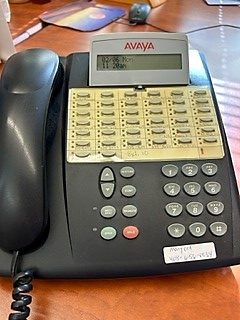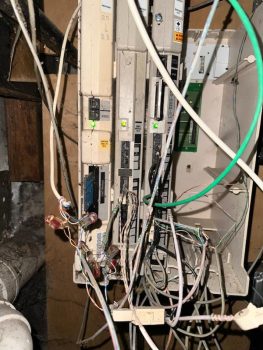
Navigating the Transition from 18D Phone System to Cloud Phone System
Embrace the modern era of communication by upgrading your small business from an 18D phone system to a robust cloud phone system, ensuring seamless remote work and effective team collaboration.
Harnessing the Power of a Cloud Phone System for Small Business
As a small business, seamless communication with clients and staff forms the backbone of daily operations. Perhaps you’ve relied on a line telephone system for years, and you’re starting to feel the pinch of outdated technology. It’s time to consider upgrading to a cloud phone system for small business. Avaya produced an incredible phone system known to many as the Avaya 18D Phone System the factory called the Avaya Partner but you know it as a reliable small business phone system for business. What we are discussing now is facing its time to migrate to a modern small business phone system that at least part of is in the cloud.
The transition from an 18D Phone System to a Modern Cloud Phone System
You might have heard some naysayers claim that VoIP isn’t suitable as a small business phone system. These voices are rooted in the past when VoIP was in its early stages. Today, with the rise of remote working and the need for enhanced connectivity, VoIP for business has become essential. What you have to remember in the 90s the Avaya Partner was state-of-the-art in terms of innovation and modern for the 90s. So if you have had the Avaya 18D Phone System then you are used to being on the cutting edge.
Overcoming the Challenges of Upgrading from an 18D Phone System
When upgrading from an 18D phone system, there are a few things to keep in mind. Modern phone systems don’t use traditional lines, meaning the hold button doesn’t work like it does on your 18D phone. Many cloud solutions require you to transfer or attendant transfer calls, which might seem clunky at first.
Leveraging the Advantages of a Cloud Phone System with VoiceOne
Then comes VoiceOne, revolutionizing the cloud phone system for small business with their PBX and Hybrid Solutions. They’ve introduced features such as “Shared Hold,” which lets you simply hit one button to hand off a call, just like the hold button on your 18D phone system.
Expanding Your Reach with a Cloud Phone System for Small Business
The advantages of switching to a cloud phone system extend beyond easy call transfers. For one, more than a few phones can ring on incoming calls. Plus, the system can accept a second call, handling it similarly to the 18D phone system.
Prepare Your Infrastructure for a Cloud Phone System
The transition might require some wire runs, as 18D phone systems relied on traditional phone wires. But the gains from a hybrid system far outweigh the adjustments. You’re not just upgrading to a cloud phone system for small business—you’re upgrading to the future.
Working Remotely with a Cloud Phone System
With a cloud phone system, your small business gains the ability to work remotely. You also gain access to a mobile app, empowering your team to work from almost anywhere. The modern features of a cloud phone system liberate you from the constraints of physical location.
The Future of Small Business Communication Lies in the Cloud
Embrace the possibilities of a cloud phone system for small business. It’s not just about replacing an old 18D phone system—it’s about stepping into a new era of communication.
Meta description: Embrace the modern era of communication by upgrading your small business from an 18D phone system to a robust cloud phone system, ensuring seamless remote work and effective team collaboration.
F.A.Q
- What is a cloud phone system for small business? A cloud phone system for small businesses is a modern communication solution that utilizes internet-based voice and data communication. Unlike traditional phone systems, cloud phone systems provide businesses with the flexibility to manage their communications from anywhere, often including additional features like mobile apps for remote work.
- How does a cloud phone system differ from an 18D phone system? An 18D phone system uses traditional telephone lines for communication, whereas a cloud phone system relies on the Internet. While the 18D system offers basic call functionalities, a cloud phone system provides advanced features like ‘Shared Hold,’ remote working capabilities, and the ability to handle multiple calls simultaneously.
- What challenges might I face when upgrading from an 18D phone system to a cloud phone system? One major change is the difference in how calls are held and transferred. For instance, a cloud phone system may require you to use transfer or attendant transfer options, which could initially feel unfamiliar. Also, as the 18D phone system uses traditional telephone lines, upgrading may require modifications to your existing infrastructure.
- What are the benefits of a cloud phone system for a small business? Upgrading to a cloud phone system brings numerous benefits for small businesses. These include the ability to handle multiple incoming calls, accept a second call simultaneously, and provide advanced features like a mobile app for remote working. Businesses can also expect improved flexibility and scalability, which can support their growth in the long run. VoiceOne PBX is one of the providers that offer a “shared hold” feature making the phone system more user-friendly.
- How can a cloud phone system improve remote working conditions for my small business? A cloud phone system allows employees to work from almost anywhere, enhancing the flexibility of remote work. With features like a mobile app, employees can communicate effectively, irrespective of their location. It ensures that businesses can maintain seamless communication, both internally and with clients, even when staff are working remotely.
- What is VoIP for Business? VoIP is an industry term meaning “Voice over the Internet” in the past and some providers used compressed signals that can sound “metallic-like” as it trims the highs and lows of voices but today companies like VoiceOne PBX use Digital Voice Lines ™ which are modern SIP. SIP is the modern up to date voice protocol that provides HD Voice.
- Cloud Phones Vs. Traditional Phones: Beyond what has been discussed in this article. Traditional 18D phone systems, once the standard for business communications, have been challenged by the rise of cloud phone systems. The complex wiring and maintenance of 18D systems often result in additional costs and physical limitations. In contrast, cloud phone systems, powered by VoIP technology, present an appealing alternative for small businesses by offering seamless communication, advanced features, and efficient integration with other software. These systems foster flexibility and mobility, critical in the age of remote work. While upfront costs may be higher, the long-term advantages of scalability, rich communication features, and enhanced business efficiency make VoIP a promising solution for businesses seeking to transcend the limitations of traditional phone lines.
Discover a comprehensive online directory for all your phone system support needs. Find skilled technicians for major brands like Avaya, Nortel, Vodavi, Toshiba Phone, Comdial, 3COM, and more. This directory offers a curated list of vendors who can provide reliable support for your office phone system, ensuring seamless communication. Online Directory for Phone System Support.


